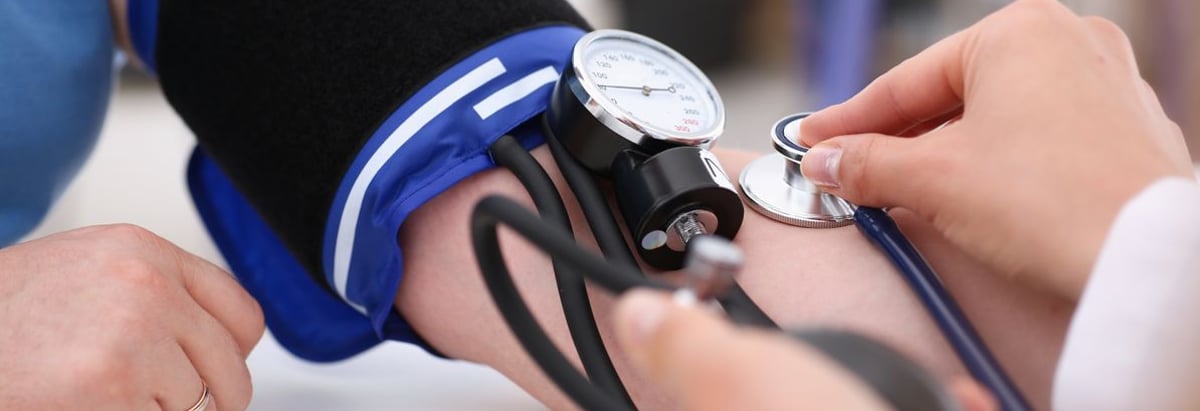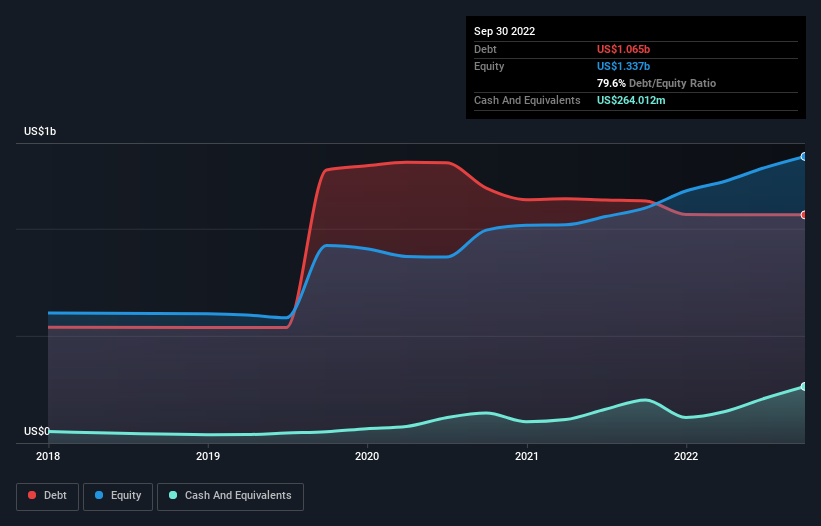- United States
- /
- Healthcare Services
- /
- NasdaqGS:OPCH
We Think Option Care Health (NASDAQ:OPCH) Can Stay On Top Of Its Debt

Warren Buffett famously said, 'Volatility is far from synonymous with risk.' When we think about how risky a company is, we always like to look at its use of debt, since debt overload can lead to ruin. As with many other companies Option Care Health, Inc. (NASDAQ:OPCH) makes use of debt. But the more important question is: how much risk is that debt creating?
When Is Debt Dangerous?
Debt assists a business until the business has trouble paying it off, either with new capital or with free cash flow. If things get really bad, the lenders can take control of the business. While that is not too common, we often do see indebted companies permanently diluting shareholders because lenders force them to raise capital at a distressed price. By replacing dilution, though, debt can be an extremely good tool for businesses that need capital to invest in growth at high rates of return. The first thing to do when considering how much debt a business uses is to look at its cash and debt together.
See our latest analysis for Option Care Health
What Is Option Care Health's Debt?
As you can see below, Option Care Health had US$1.06b of debt at September 2022, down from US$1.13b a year prior. On the flip side, it has US$264.0m in cash leading to net debt of about US$800.6m.

A Look At Option Care Health's Liabilities
Zooming in on the latest balance sheet data, we can see that Option Care Health had liabilities of US$586.8m due within 12 months and liabilities of US$1.15b due beyond that. Offsetting this, it had US$264.0m in cash and US$420.1m in receivables that were due within 12 months. So its liabilities total US$1.05b more than the combination of its cash and short-term receivables.
While this might seem like a lot, it is not so bad since Option Care Health has a market capitalization of US$5.10b, and so it could probably strengthen its balance sheet by raising capital if it needed to. But we definitely want to keep our eyes open to indications that its debt is bringing too much risk.
We measure a company's debt load relative to its earnings power by looking at its net debt divided by its earnings before interest, tax, depreciation, and amortization (EBITDA) and by calculating how easily its earnings before interest and tax (EBIT) cover its interest expense (interest cover). The advantage of this approach is that we take into account both the absolute quantum of debt (with net debt to EBITDA) and the actual interest expenses associated with that debt (with its interest cover ratio).
Option Care Health's debt is 2.7 times its EBITDA, and its EBIT cover its interest expense 4.4 times over. This suggests that while the debt levels are significant, we'd stop short of calling them problematic. Looking on the bright side, Option Care Health boosted its EBIT by a silky 33% in the last year. Like a mother's loving embrace of a newborn that sort of growth builds resilience, putting the company in a stronger position to manage its debt. When analysing debt levels, the balance sheet is the obvious place to start. But it is future earnings, more than anything, that will determine Option Care Health's ability to maintain a healthy balance sheet going forward. So if you want to see what the professionals think, you might find this free report on analyst profit forecasts to be interesting.
Finally, while the tax-man may adore accounting profits, lenders only accept cold hard cash. So we clearly need to look at whether that EBIT is leading to corresponding free cash flow. During the last three years, Option Care Health generated free cash flow amounting to a very robust 97% of its EBIT, more than we'd expect. That puts it in a very strong position to pay down debt.
Our View
The good news is that Option Care Health's demonstrated ability to convert EBIT to free cash flow delights us like a fluffy puppy does a toddler. But, on a more sombre note, we are a little concerned by its interest cover. It's also worth noting that Option Care Health is in the Healthcare industry, which is often considered to be quite defensive. Looking at the bigger picture, we think Option Care Health's use of debt seems quite reasonable and we're not concerned about it. After all, sensible leverage can boost returns on equity. There's no doubt that we learn most about debt from the balance sheet. However, not all investment risk resides within the balance sheet - far from it. These risks can be hard to spot. Every company has them, and we've spotted 1 warning sign for Option Care Health you should know about.
Of course, if you're the type of investor who prefers buying stocks without the burden of debt, then don't hesitate to discover our exclusive list of net cash growth stocks, today.
New: AI Stock Screener & Alerts
Our new AI Stock Screener scans the market every day to uncover opportunities.
• Dividend Powerhouses (3%+ Yield)
• Undervalued Small Caps with Insider Buying
• High growth Tech and AI Companies
Or build your own from over 50 metrics.
Have feedback on this article? Concerned about the content? Get in touch with us directly. Alternatively, email editorial-team (at) simplywallst.com.
This article by Simply Wall St is general in nature. We provide commentary based on historical data and analyst forecasts only using an unbiased methodology and our articles are not intended to be financial advice. It does not constitute a recommendation to buy or sell any stock, and does not take account of your objectives, or your financial situation. We aim to bring you long-term focused analysis driven by fundamental data. Note that our analysis may not factor in the latest price-sensitive company announcements or qualitative material. Simply Wall St has no position in any stocks mentioned.
About NasdaqGS:OPCH
Option Care Health
Offers home and alternate site infusion services in the United States.
Very undervalued with excellent balance sheet.


